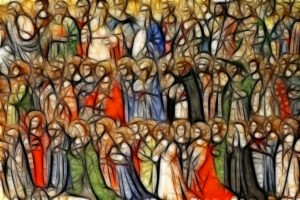 All Saints 2023 St Andrew’s Milngavie
All Saints 2023 St Andrew’s Milngavie
Today we celebrated All Saints Day accompanied by Abigail.
This evening 5pm Evensong at All Saints to celebrate their Patronal – all invited.
This Week
Monday 3pm Vestry Garden Room
Tuesday 10am – Prayer Group in the Garden Room
Thursday 10am – Said Holy Communion followed by coffee in Friendship House.
Looking ahead – Advent Course starts Thursday November 23rd at 3pm – in choir vestry at All Saints. It will run for 4 consecutive Thursdays, studying a chapter of the book each week. The book we will be studying is The Meaning in the Waiting by Paula Gooder. I suggest buying your own copy, it is available on Amazon and in any Christian Book Shop. If you have any problems, let me know.
Readings for next Sunday – Remembrance Sunday – Amos 5:18-24 1 Thessalonians 4:13-end Matthew 25:1-13
Today’s Readings – Rev.7:9-end, 1 John 3:1-3, Matthew 5:1-12.
Today is All Saints day. The day we remember all Christians and especially those who have gone before us. When we think of ‘saints’ we often think the sort of person you would see in a stained-glass window in churches. They somehow seem saintly because they looked the part, ancient, long gone, of another world…but when we look at ourselves, I think we don’t really look on ourselves as saintly. After all is it possible to be saintly and live in a modern age living complicated and messy lives as we so often do? Did the saints of old struggle with friends, families, marriage, children and jobs? And surely to be a saint you have to be long gone!
As we survey the long line of the saints who have been formally named in the Church’s calendar, we find the variety of people – women and men – extraordinary in its range; all sorts, types and contexts. This is tremendously encouraging – a source of hope for us all; “we who feebly struggle whilst they in glory shine”
But what might they have to say to us, the saints of St Andrew’s in this 21st century?
And so, reflecting on this, we may recall individuals who have helped us and encouraged us on our way in times past, those we have loved and who have been part of our lives who have nurtured our spiritual wellbeing and developed our discipleship.
The Beatitudes which we heard this morning in a way express the meaning of this discipleship. They help to shape our lives. In Matthew’s account the Beatitudes reveal the character and person of Jesus. And as such they are a road map for us, for the church, for all the saints. The life of the saint is after all lived in communion with Christ. But a life shaped by the Beatitudes will not necessarily be a quiet and comfortable one. It will require courage, patience time and commitment.
Being a saint has never been understood as being simply just kind to your friends and neighbours, being a saint has meant hurting for others, being a saint has meant caring for the least and the lost.
The saints have always been people who have proclaimed the Good News in thought and deed. They have usually been born into ordinary circumstances but achieved extraordinary things because they followed God’s call, struggling and wrestling with God all the way.
People like you and me….
On All Saints Day we need to know that we are the saints. The beatitudes describe as blessed the lives of those who struggle, who suffer and know their weakness. These are not the lives of stained glass or plaster saints but the lives of actual people learning to rely on God in their everyday successes and failures, working together for that day when God’s purposes will be finally revealed.
We must remember that through our baptism we become children of God, joint heirs with Christ. We are adopted into the family of God and because we are joint heirs with Christ, we also share in the resurrection. In this way, the family of God extends beyond faithful Christians on earth, but also to the blessed in heaven. This is what makes the communion of the saints truly universal: it spans history, geography, nationality, race, and all other temporal barriers we might erect.
St John The Divine describes this in his vision, “After this I looked, and there before me was a great multitude that no one could count, from every nation, tribe, people and language, standing before the throne and before the Lamb. They were wearing white robes and were holding palm branches in their hands. And they cried out in a loud voice:“Salvation belongs to our God, who sits on the throne, and to the Lamb.” Revelation 7
It is a humbling, yet awe inspiring thought to know that when we worship God in the Eucharist, we are joining our worship with every Christian in heaven and on earth from the beginning of time until the present day. May we know that no matter what happens WE are Saints. And no one can take that away from us.
May we live as the saints we are called to be. Amen.
